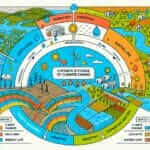The IELTS Reading test requires candidates to understand and interpret texts on a variety of topics. One such topic, which is not only relevant but also increasingly common due to current global concerns, is the issue of food security in the context of a changing climate. Understanding the challenges associated with managing global food security under climate change is critical, not only for scoring well in the IELTS Reading but also for developing a broader world view. This topic has gained significant attention in recent years, appearing frequently in academic and policy discussions, making it a plausible candidate for future IELTS Reading tests.
Sample Reading Passage
Managing Global Food Security in a Changing Climate
In today’s world, food security stands as one of the most pressing challenges humanity faces. As the global population continues to rise, the demand for food increases concurrently. However, the resources required to produce this food, such as water, soil, and space, remain limited. Amidst this scenario, climate change presents an additional layer of difficulty.
By altering weather patterns, impacting crop yields, and increasing the frequency of extreme weather events, climate change affects food production on every continent. In regions already vulnerable to food insecurity, such as sub-Saharan Africa and parts of Asia, the consequences can be particularly severe. Droughts, floods, and unpredictable weather can devastate crops, leading to significant food shortages and heightened competition for resources.
 Climate Change Impact on Agriculture
Climate Change Impact on Agriculture
Moreover, climate change has ramifications beyond just the physical production of food. It affects the entire agricultural supply chain. For instance, transportation networks crucial for delivering food from farms to markets can be disrupted by extreme weather conditions. Additionally, increased heat and changing humidity levels can facilitate the spread of pests and diseases, further threatening crop yields.
To ensure global food security, it is imperative to adopt climate-smart agricultural practices. These include improved irrigation techniques, the development of drought-resistant crop varieties, and the use of sustainable farming methods that enhance soil health. International cooperation is also vital, as climate change and food security are global issues that transcend national borders. By sharing technology, knowledge, and resources, the world can collectively work towards mitigating the adverse effects of climate change on food security.
Practice Questions
Question Types
Multiple Choice
-
What is highlighted as the primary challenge to global food security?
- A. Rising global population
- B. Limited resources for food production
- C. Climate change
- D. All of the above
-
Which regions are mentioned as particularly vulnerable to food insecurity due to climate change?
- A. North America and Europe
- B. Sub-Saharan Africa and parts of Asia
- C. Australia and South America
- D. Central and Eastern Europe
True/False/Not Given
-
The resources needed to produce food worldwide are increasing.
- True
- False
- Not Given
-
Drought-resistant crops are an example of a climate-smart agricultural practice.
- True
- False
- Not Given
Sentence Completion
- Climate change affects food production by ____.
- To counter the effects of climate change on food security, it is important to ____.
Answer Keys and Explanations
Multiple Choice
-
D. All of the above
- Explanation: The passage states that rising global population, limited resources, and climate change are all challenges to global food security.
-
B. Sub-Saharan Africa and parts of Asia
- Explanation: The passage specifically mentions that these regions are particularly vulnerable to food insecurity due to climate change.
True/False/Not Given
-
False
- Explanation: The passage states that resources such as water, soil, and space remain limited, not increasing.
-
True
- Explanation: The passage lists drought-resistant crop varieties as an example of climate-smart agricultural practices.
Sentence Completion
-
altering weather patterns, impacting crop yields, and increasing the frequency of extreme weather events.
- Explanation: This information is found in the first paragraph of the passage where the effects of climate change on food production are discussed.
-
adopt climate-smart agricultural practices.
- Explanation: The solution suggested in the passage to counter the effects of climate change includes the adoption of climate-smart agricultural practices.
Common Mistakes to Avoid
- Misinterpreting information: Ensure that you understand the difference between explicitly stated facts and assumptions.
- Skimming too quickly: Although skimming is a valuable skill, overlooking key details can lead to incorrect answers.
- Misunderstanding the question format: Different question types require different strategies. Be sure to practice each type thoroughly.
Vocabulary
- Food Security (noun) /fuːd sɪˈkjʊərəti/ – When all people at all times have access to sufficient, safe, nutritious food to maintain a healthy and active life.
- Climate Change (noun) /ˈklaɪmət tʃeɪndʒ/ – Long-term changes in temperatures and weather patterns, primarily due to human activities such as burning fossil fuels.
- Drought-resistant (adjective) /draʊt rɪˈzɪstənt/ – Capable of surviving prolonged periods with little or no water.
Grammar Focus
Conditional Sentences
- Type 1 Conditional: If + present simple, will + base verb
- Example: If we adopt climate-smart practices, we will mitigate the adverse effects of climate change.
Passive Voice
- Passive Construction: Object + auxiliary verb (be) + past participle
- Example: The entire agricultural supply chain is affected by climate change.
Conclusion
Scoring well in the IELTS Reading section requires a combination of practice, application of effective strategies, and familiarity with various topics. By understanding the challenges of managing global food security in a changing climate, candidates can better prepare for similar topics in their IELTS exams. Consistent practice, attention to detail, and careful analysis of questions and passages will ultimately lead to improved performance.
Remember, effective preparation and a good understanding of potential reading topics are key to achieving success in the IELTS Reading test.


